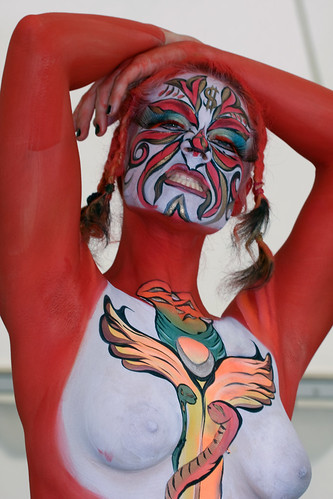In fact we are fond of painting our bodies since prehistoric times. In past we were used to paint our bodies with materials like natural dyes, paints and pigments. In some cases we used ash, and clay, too.
 |
| TEMPORARY BODY PAINTING |
The markings that the people make on their bodies are thought to have magical powers with which one could ward off evil spirits or the tribal enemies. Such was the thinking in past. The painting of bodies was also coined with celebrating of auspicious occasions like New Year or a dance party. Same practice can still observed in the indigenous populations of the countries like New Zealand, Australia, the Pacific Islands, and certain parts of Africa.
 |
| TEMPORARY BODY PAINTING |
In India the women and men are fond of using Henna. It is a colour extracted from a plant of Henna; it is also known as Mehandi. This type of body painting with Henna has been a fashion in India and the Middle East since many years. People paint their hands and legs and other parts of body with Henna during auspicious ceremonies like weddings. The use of henna or Mehandi has become popular in the Western countries, too, since last two decades.
 |
| TEMPORARY BODY PAINTING |
 |
| TEMPORARY BODY PAINTING |
The art of body painting is not a new phenomenon in the countries of South America, too. People here have been using indigenous materials to paint their body and body parts. They use wet charcoal and other materials available in the local surrounding. In some parts of America, a material known as Huito is used to paint the bodies and faces. Huito is a black dye, and it takes weeks to fade away.







 Print this page
Print this page